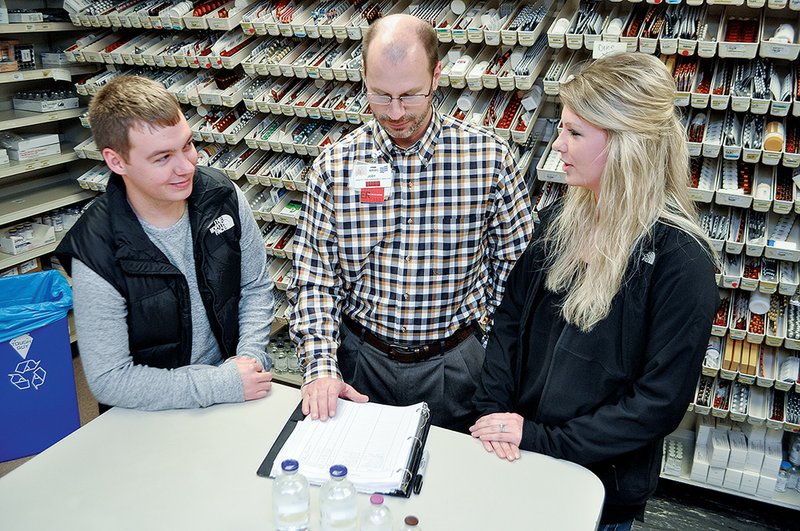White River Medical Center in Batesville had 30,739 patients visit the emergency room in 2013, according to U.S. News & World Report. Hospital officials hope to see that number reduced with the implementation of a new Community Care Network that involves a health-coach training program at Lyon College.
In April, Gary Bebow, the hospital’s CEO, and two local physicians attended a seminar on innovative ways to improve community health care. At the seminar, Dr. Barry Bittman, chief innovation officer at Meadville Medical Center in Meadville, Pa., spoke on how he partnered with Allegheny College to form a program designed to train pre-health career students to become health coaches to work with the hospital’s most vulnerable patients — those at the highest risk of being readmitted to the hospital.
WRMC representatives presented the idea in June to Lyon College in Batesville, and the first training class was held in fall 2013. Mark Schram, associate professor of biology and Lyon’s principle pre-med adviser, said the program is beneficial to more than just students on a health-profession track.
“For the spring class, we have five psychology students,” Schram said. “We could even insert students in the business field into this program if they have an interest in hospital administration. There’s a great diversity among the students taking the program.”
Virginia Wray, vice president for academic services and dean of the faculty at Lyon, was part of the group that heard the initial presentation for the program.
“The health-coaching program is a wonderful addition to Lyon’s curriculum,” Wray said. “The lecture component gives students an excellent overview of all aspects of medicine, from clinical practice to health care costs, legal issues to preventative practices. In the practicum component, students actually help real people become healthier and, as a result, hospital costs to lower.”
Students will be paired with patients discharged from the hospital and help to assure that they are following physicians’ instructions and attending follow-up appointments; getting prescriptions filled and taking them as ordered; and getting proper nutrition. As a result, hospital officials hope to see fewer emergency-room visits and reduce readmittance to the hospital, thus preventing unnecessary use of expensive health care resources, Bebow said.
Hospital representatives, including managers, clinicians and administrators who are considered experts in their fields, are teaching several of the courses in the program, which cover a variety of health care topics, such as diabetes, heart disease, obesity and medical insurance. The lecture portion of the program is held at Lyon; then students participate in the practicum portion at the hospital. As students work with their patients, they will be mentored and supervised by Michelle Brewer, director of the WRMC Community Care Network and patient-care coordinator, and Dr. Chris Steel, medical director for the WRMC Community Care Network.
“They will reinforce what is taught to them by teaching their patients,” Steel said. “The best way to learn is to teach someone. So one week they might focus on a pharmaceutical plan for their patient and meet with a pharmacist to go over the patient’s medications, and the next week they might meet with a dietitian to go over a diet plan for the patient. In the end, they’ll know all the steps of community health care, and hopefully, this will encourage more students to consider going into primary care, which is in high demand in rural areas like Batesville.”
Steel added that students in the Pennsylvania program were found to receive preference when applying to medical school. He said he and Schram plan to visit with representatives from the University of Arkansas for Medical Sciences in Little Rock to discuss the experience Lyon’s students will receive in the health-coach program.
“This program is not only a benefit to the community,” Bebow said, “but it also gives these students hands-on experience that gives them a leg up when applying to medical school.”
Students were nominated by Lyon faculty members to participate in the first health-coach training class last fall. Among those was Ryan Waddell, a junior biology major with an emphasis in medicine.
Waddell said the choice to participate in the course was a simple one.
“You can’t say no to this. It’s great experience, and we’re learning how to interact with patients and making great connections at the hospital,” Waddell said. “This is experience we’re not going to get in a classroom. We’re learning from health care professionals.”
Taylor Sanders, a senior biology major who plans to study to be a physician’s assistant, said she was uncertain what to expect from the course at first but now believes it will be a great asset to starting her career.
“I think we’ll learn a lot in this program that we would not have known otherwise, starting our careers,” Sanders said. “We’re learning how to help patients change their lifestyles.”
Steel said one of the main goals of the program is to develop a community network by identifying civic, federal, state and religious organizations that provide health care services to the community. Students will be supplied information about these services that they can pass on to their patients.
Sanders and Waddell, both from small towns, agreed that the greatest benefit of participating in the health-coach program is that they are learning skills they can apply to improve their communities.
“I think this is going to be great for the kids,” said Schram, who teaches an ethics class as part of the program. “It gives the students a greater insight into the medical world. I’ve actually learned a lot myself about the inner workings of the hospital and the business side of it. I think it’s really cool that students are getting information covering the whole scope of health care.
“It’s going to be a huge community service, and I think once it’s out there, it’s going to gain momentum.”
